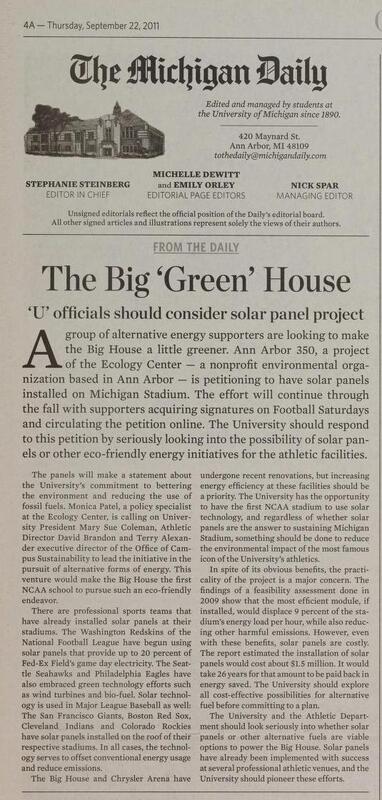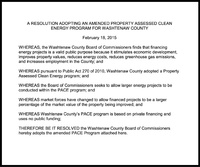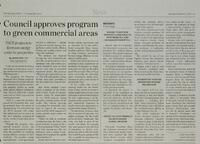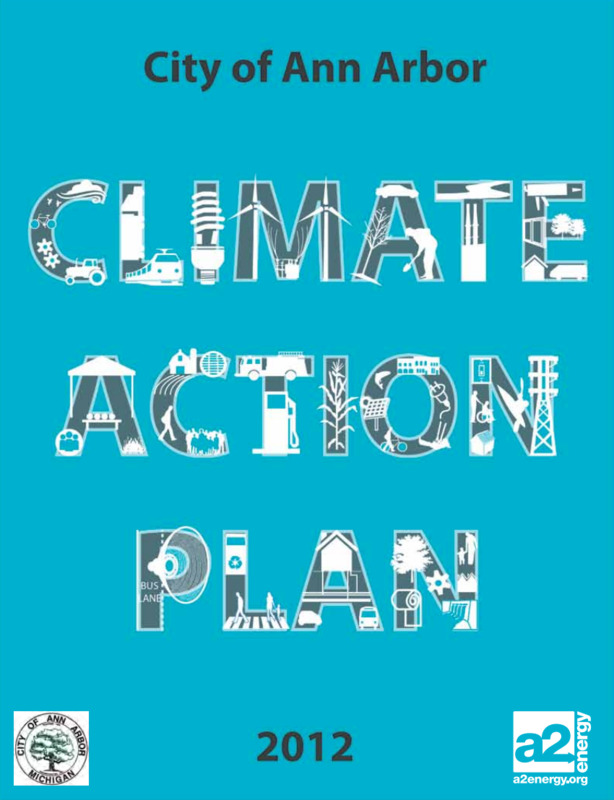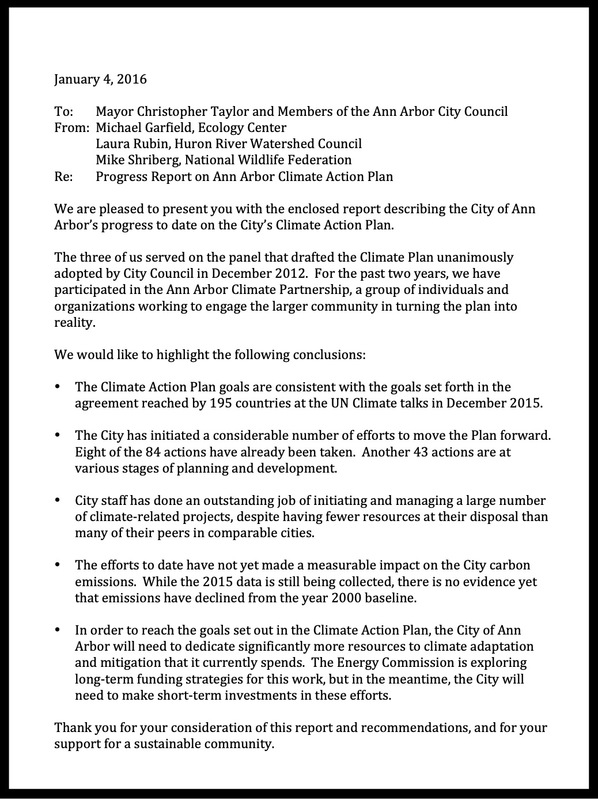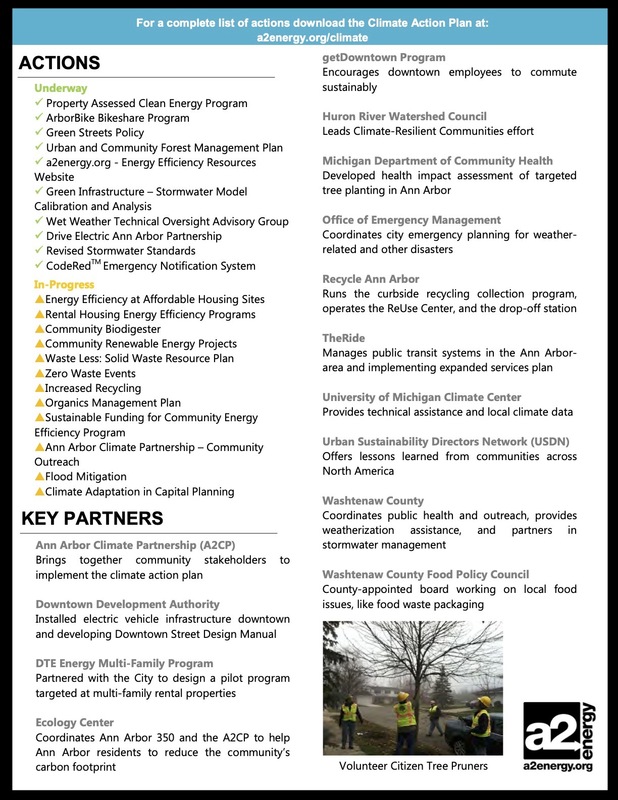Organizing Local Climate Action
Since climate change has become more of a focal point in politics during the 2000’s both on the federal and local scale, the Ecology Center (EC) has been working closely with the City of Ann Arbor to prioritize clean energy efficiency. Building on the EC’s continuous commitment to reducing fossil fuel use, initiatives like Ann Arbor 350, Property Assessed Clean Energy (PACE), and the Climate Action Plan introduced new programs to the city, increased community engagement and interest in environmental issues, and elevated Ann Arbor to a leader in the fight against climate change.
Ann Arbor 350
The EC established Ann Arbor 350 in 2009 after a visit from climate activist Bill McKibben who founded 350.org, an international forum for encouraging climate action named according to 350ppb – the safest maximum limit of carbon dioxide in the atmosphere. The EC began Ann Arbor 350 to inform citizens and encourage individuals and organizations alike to take action and support local policies and initiatives meant to combat climate change. Via the Ann Arbor 350 platform, the EC helped organize Climate Meet-ups where interested citizens could discuss climate change and individual actions they could adopt to minimize their negative impact on the environment.
In 2010, the EC mobilized Ann Arbor 350 to embrace the 10/10/10 Garden Challenge, a mission to promote growing one’s own food. Working with their long time partner organization Project Grow, the EC helped organize community gardens which not only promoted healthy and natural food but also gave citizens the opportunity to work together on a goal to reduce their carbon footprint. In the two years following the start of the Garden Challenge, the EC identified around 200 “350 Gardens,” so called because they were organized through Ann Arbor 350. An Ann Arbor News article from November 2010 spotlighted this event as one of the EC’s local achievements writing, “The project is the local piece of a global movement to reduce carbon emissions.”
Following the 10/10/10 Garden Challenge, the EC’s Ann Arbor 350 promoted other new missions and goals, including the Household Energy Challenge, the Commuter Challenge, and the Mission Zero Fest. In 2011, the EC organized a petition via Ann Arbor 350, urging the University to install solar panels on the football stadium, the Big House. The petition originally aimed to garner more than 10,000 signatures, yet according to a Michigan Daily article from the time of the campaign, there was mixed support from the campus community and administration. An opinion piece published by and from the Michigan Daily encourages University leaders to take the initiative more seriously:
“The University should respond to this petition by seriously looking into the possibility of solar panels or other eco-friendly energy initiatives for athletic facilities… The panels will make a statement about the University’s commitment to bettering the environment and reducing the use of fossil fuels.”
PACE
The Ecology Center also helped develop the state’s first Property Assessed Clean Energy (PACE) financing program to incentivize businesses and commercial properties to upgrade infrastructure and energy use to reduce emissions. After the EC and other organizations advocated for the benefits of PACE, the Michigan state legislature approved it in 2010, giving local municipalities the choice to opt in to the program. In 2011, the Ann Arbor City Council voted to adopt PACE, marking a significant step towards enacting more environmentally focused policies. To encourage the business community’s use of PACE in Ann Arbor, the Ecology Center helped host informational meetings and training sessions for those interested.
Since PACE has been adopted, the EC’s role has been centered on the implementation of the plan, the allocation of PACE bonds, and how it could further influence similar programs outside the commercial business realm. To do this, the EC has and will continue to work with local officials and leaders in other PACE districts across Michigan to inform them about new policies that could encourage further clean energy use and efficiency. Though the EC wants to influence the program’s growth outside the commercial realm, it has also focused on engaging businesses with PACE, prompting discussions about clean energy use and explaining the advantages and process of upgrading energy sources.
The Climate Action Plan
In 2012, the City of Ann Arbor passed their first version of the Climate Action Plan, setting the goal for the City to accomplish a 90% reduction in climate emissions by 2050. The Plan has multiple stages, outlining the City’s progression towards phasing in measures that target energy, waste, and water. The Ecology Center openly supported this plan and promoted it via newsletters to community members. In 2011, the EC’s Mike Garfield joined Ann Arbor’s Climate Action Task Force, a coalition of twelve individuals representing 12 organizations in Ann Arbor committed to identifying specific action items for the City to complete in order to achieve the plan. In September of 2011, the Climate Action Task Force began meeting monthly, leading up to the approval of the plan in December of 2012.
However, many community members and leaders were hesitant about fully adopting the Plan, considering the extent of the change and the financial impact since the Plan would require some significant costs over $25,000 to be presented to the Ann Arbor City Council before adoption for approval. Consequently, the Plan received little funding in the early years of its announcement. To try and increase funding and positive interest in the community, the EC called in Ann Arbor 350 to help achieve some of the goals highlighted by the Climate Action Plan such as reducing emissions from buildings and complexes, encouraging reliance on renewable energy by financing added costs, and reevaluating the transportation system to focus more on carpooling and efficiency. With Ann Arbor 350, the EC sought to spread awareness of the need for the Plan and mobilized residents to take individual actions in accordance with the values of the Plan such as relying on homegrown food, limiting energy consumption, and bikeathons.
In 2014, a Working Group of stakeholders from city government and the university created the Ann Arbor Climate Partnership, a coalition of organizations and individuals dedicated to ensuring the City fulfills their ambitious Climate Action Plan. The EC joined the Partnership as the convenor and host, positioned to mediate discussions and encourage other community members to join. One of the biggest focus areas of the Partnership was forming a budget plan to enforce the Plan and make sure city officials allocated enough funding to meet their carbon cutting goals. Specifically, the Partnership lobbied for the City to set aside $900,000 of city funds per year towards the Climate Action Plan. In 2017, after ambitious campaigns lobbying for this budget, the City adopted legislation that solidified this funding amount.
Advancing Ann Arbor’s Transit Systems
Since forming the Climate Partnership and adopting the Climate Action Plan, the EC has made progress on a number of initiatives seeking to advance Ann Arbor as a climate leader. Notably, the EC took on the goal of modernizing Ann Arbor’s transit systems to become environmentally conscious and encouraging the City’s transition from reliance on cars to buses. In 2016, the EC began working with Washtenaw County Partners for Transit (P4T), an organization advocating for progressive transportation upgrades and increased accessibility. Together, the EC and P4T promoted their Ann Arbor Area Transportation Authority's (AAATA) Transit Improvement Plan, which consisted of multiple projects to improve public transportation such as upgrading bus stops and facilities. By educating voters on its advantages and intended impacts, the EC helped increase community favorability of AAATA, which passed smoothly on the ballot in 2018. The coalition was a great success for the EC as it engaged community members from across the region as well as elected officials and other local leaders.
In addition to AAATA, the EC promoted the use of electric vehicles in Ann Arbor, advocating for officials to adapt the City to be more electric vehicle friendly. To do this, the EC partnered with ChargeUp Midwest, a campaign stretching across Michigan, Illinois, Ohio, Minnesota, and Missouri advocating for reducing carbon emissions from the region’s transportation systems. Together, the EC and ChargeUp Midwest set specific action items such as engaging local officials in discussions about clean energy use, increasing press coverage on their mission, and hosting workshops for relevant stakeholders to learn about how to better equip the city for electric vehicle use. By engaging with local utility providers around the potential for clean energy in Ann Arbor, the EC and ChargeUp Midwest organized more than $20 million in funding for electric vehicle charging stations around the city.
Beyond the City of Ann Arbor, the EC has also advocated for policies that promote electric vehicle use state wide. The EC initiated their campaign called Built By Michigan to engage stakeholders across the state in action plans to effectively and efficiently transition to electric vehicle use while optimizing job opportunities. To increase interest in Built By Michigan, the EC released comprehensive factsheets detailing electric vehicle emissions as well as the need and intended impacts of electric vehicle oriented policies. Presenting statistics, case studies, and research, the factsheets offers concrete steps for the state to adopt to encourage electric vehicle use. The first step outlined reads:
“Michigan’s Legislature and U.S. Congressional delegation should incentivize the use of EVs and the expansion of charging networks, while the Department of Environmental Quality should maximize the amount of VW Environmental Mitigation Trust dollars funding EV charging infrastructure.”
In 2017, the Ann Arbor City Council voted to unanimously pass a second version of their Climate Action Plan, called A2Zero, which focused even more on transitioning to electric vehicle use than the prior plan. However, many environmental leaders in the community still saw room for more aggressive policies to equip the City with electric vehicle charging stations. The EC lobbied for the additional Electric Vehicle Readiness Ordinance which would require all parking garages in the City to include charging stations for electric vehicles. Years later in January 2021, the City Council effectively approved the ordinance.
Climate Action Today
Though Ann Arbor has made significant steps in the past decade to lower carbon emissions, the city is just getting started. As of 2021, Ann Arbor’s Climate Action Plan and A2Zero are still in the beginning stages. Moving forward in the pursuit of meeting the 2050 carbon emissions reduction goal, the EC continues to work with the City and the University to help inform residents, officials, and all community members about the ways they can fully embrace the initiative to become carbon neutral. Yet, A2Zero is “living” according to city officials, meaning the most pressing missions will evolve and along the way, the EC will continue to push the agenda forward.
Article written by Lillian Gooding, member of the Spring/Summer 2021 Research team.

